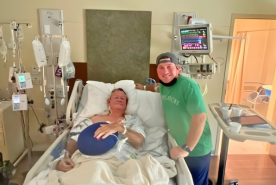October 15, 2024
The National Kidney Foundation (NKF) recently shared its support for more transparency in kidney transplant offers with the Department of Health and Human Services. They asked that the Centers for Medicare and Medicaid Services (CMS) require transplant centers to tell patients on the kidney transplant waitlist when they turn an offered kidney down for them.
Why Transparency Matters
Many people on the waitlist receive multiple kidney offers that don't lead to a transplant. One study1 found that people who eventually got a kidney transplant received an average of 17 offers over 422 days. Even more concerning, those who passed away while on the waitlist received a median of 16 offers over 651 days.
What About the Patient Perspective?
Let's take a hypothetical patient named Carmen. She was just added to the kidney transplant waitlist. Her name is now on the "match run," where people on the waitlist are ranked for organs from deceased donors. After a few months, Carmen's transplant center starts getting kidney offers for her. That means organ procurement organizations (OPOs) across the country have found kidneys that might match her.
Carmen's transplant team sees these offers but usually turns them down. Offers are declined for many reasons–usually over concerns about the kidney's quality. In Carmen's case, her healthcare team is worried that the offered kidneys won't work immediately. She’d then have a longer recovery time in the hospital.
But what does Carmen think?
Placing Patients at the Center of Their Care
All patients deserve to know when their transplant center turns down a kidney for them, even if the medical team has good reasons. Being on the waitlist is a tough and deeply personal experience. Every potential transplant recipient has a unique opinion on risk and time spent on the list.
Returning to Carmen, she may prefer to get a kidney quickly rather than wait for a perfect match. Learning why a kidney was turned down allows Carmen and patients like her to have a say in future decisions regarding organ acceptance. Since opinions may change as time passes, continued conversations between the transplant team and the patient are essential.
NKF believes patients should understand the decisions being made for them. This transparency will lead to better conversations between patients and healthcare providers about what patients want from their transplants. It ensures the patient remains at the center of their transplant journey, where they belong.
Want to support initiatives like organ offer transparency? Become a Voices for Kidney Health advocate today. Your voice makes all the difference.
Source
1Husain SA, King KL, Pastan S, et al. Association Between Declined Offers of Deceased Donor Kidney Allograft and Outcomes in Kidney Transplant Candidates. JAMA Netw Open. 2019;2(8):e1910312. doi:10.1001/jamanetworkopen.2019.10312


















